Introduction to Peptide Chemistry
Peptide chemistry has emerged as a beacon of hope and innovation in modern medicine. At its essence, it focuses on investigating and creating peptides, which are short sequences of amino acids that constitute the fundamental components of proteins. These vital biochemical compounds function as hormones, neurotransmitters, and key regulators in numerous physiological processes within the body. The evolution of peptide chemistry, mainly through custom peptide synthesis, has allowed scientists to design and construct these molecules with unparalleled precision. It has paved the way for new therapeutic applications, offering solutions that target specific disease pathways with an accuracy that traditional drugs often cannot achieve.
The Science Behind Peptide Synthesis
Peptide synthesis is a sophisticated process that enables the creation of peptides with specific amino acid sequences tailored for desired biological functions. Solid-phase peptide synthesis (SPPS), developed in the early 1960s by Nobel laureate Bruce Merrifield, is among the most celebrated techniques in this field. What makes SPPS revolutionary is its method of sequentially adding amino acids to a growing chain tethered to an insoluble resin. It allows for easier peptide purification, making the process more efficient and scalable. Additionally, less common liquid-phase synthesis is utilized to construct peptides that require extremely delicate handling. These methodological advancements have greatly expanded the range of peptides that can be synthesized, opening new avenues for therapeutic applications that exploit peptides’ unique ability to interact specifically with biological targets.
Therapeutic Applications of Peptides
The therapeutic possibilities of peptides are extensive and diverse, reaching into many fields of medicine. Peptides naturally exhibit high potency, specificity, and a predictable mode of degradation, which makes them ideal candidates for therapeutic agents. In metabolic disorders, insulin—a peptide hormone—has been instrumental in treating diabetes by regulating blood sugar. In oncology, peptides are utilized as homing molecules to direct cytotoxic agents to cancer cells, thereby minimizing damage to surrounding healthy tissues. Furthermore, peptides like enfuvirtide demonstrate unique mechanisms of action, such as blocking viral entry into human cells, offering innovative approaches to infectious disease management. With the growing threat of antibiotic resistance, antimicrobial peptides are gaining attention for their potential to serve as alternative therapeutics in combating resistant strains, showcasing their adaptability and significance in contemporary medicine.
Cutting-Edge Research in Peptide Therapeutics
The realm of peptide therapeutics is undergoing a renaissance, driven by cutting-edge research that continually reveals its vast potential. Recent scientific studies have explored the utility of peptides in addressing previously intractable disorders, including various neurodegenerative diseases. These conditions, characterized by progressive degeneration of nervous tissue, present significant treatment challenges. Peptides offer promising avenues for intervention by ameliorating symptoms and potentially altering disease course through precise molecular interactions. Such research exemplifies the transformative impact peptides could have on patient care, particularly as tools for precision medicine that align treatments with individual patient profiles, thereby enhancing therapeutic efficacy and safety.
Peptide Chemistry in Biopharmaceuticals
Biopharmaceuticals represent a burgeoning pharmaceutical industry sector, with peptides playing a pivotal role. As small biomolecules, peptides offer the advantage of precisely modulating biological pathways, making them invaluable in developing drugs requiring high specificity levels. In cancer treatment, for example, peptide-based drugs can selectively target and bind to tumor markers, delivering potent therapeutic agents directly to cancerous cells while sparing normal tissues. Furthermore, peptides such as monoclonal antibodies are key components in drug delivery systems, enhancing biologics’ bioavailability and efficacy. Their ability to improve the pharmacokinetics of therapeutic compounds underscores their potential to revolutionize the landscape of biopharmaceutical development.
Challenges and Limitations
Despite peptides’ promise, several challenges deter their broader therapeutic application. Chief among these is their inherent instability, as they are readily susceptible to enzymatic degradation both in the gastrointestinal tract and the circulatory system. This instability often limits their bioavailability and therapeutic lifespan, complicating their delivery and administration. Addressing these challenges involves pioneering novel strategies, such as incorporating non-natural amino acids to enhance stability or employing advanced delivery systems, such as nanocarriers, that protect peptides until they reach their target. These innovations are vital in overcoming existing hurdles, allowing expanded use of peptides across various medical fields and vastly improving patient outcomes.
The Future of Peptide Chemistry in Medicine
The future of peptide chemistry is brimming with opportunities, promising to reshape modern medicine further and bolster its role in combating a wide range of ailments. Prospects of peptide-based vaccines, which stimulate the immune system to target specific diseases without the risks associated with live pathogens, are fascinating. Additionally, with the continuous advances in personalized medicine, peptides stand to play a crucial role in tailoring treatments to individual genetic makeups. This customized approach improves therapeutic success and reduces potential adverse side effects, as treatments are aligned more closely with patients’ unique biological characteristics. Such advancements reaffirm the transformative power of peptides in driving the next frontier in healthcare innovation.
Concluding Thoughts on Peptide Chemistry
In summary, peptide chemistry continues to be a driving force in the evolution of modern therapeutic strategies. Its integration into medicinal advancements resolves current challenges and positions it at the helm of future drug development. As our understanding of the biochemical underpinnings of disease expands, so does the potential for peptide chemistry to address these challenges with greater precision and efficacy. Embracing the breakthroughs in this arena promises to enhance the quality of patient care and redefine the disease treatment paradigm, ensuring that healthcare solutions are both innovative and responsive to the growing complexity of individual clinical needs. Encouraging vibrant research and development within peptide chemistry is crucial, as this field holds the key to unlocking unprecedented therapeutic opportunities and catalyzing a new era of medical discovery.
ALSO READ: IV Therapy for Cold and Flu Season



